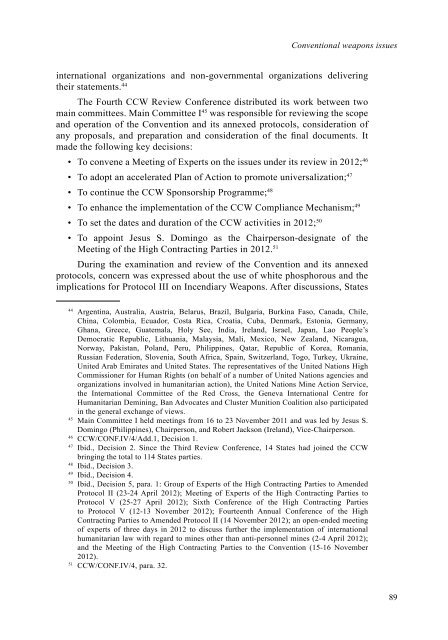DYB2011-Part-II-web
DYB2011-Part-II-web
DYB2011-Part-II-web
Create successful ePaper yourself
Turn your PDF publications into a flip-book with our unique Google optimized e-Paper software.
Conventional weapons issues<br />
international organizations and non-governmental organizations delivering<br />
their statements. 44<br />
The Fourth CCW Review Conference distributed its work between two<br />
main committees. Main Committee I45 was responsible for reviewing the scope<br />
and operation of the Convention and its annexed protocols, consideration of<br />
any proposals, and preparation and consideration of the final documents. It<br />
made the following key decisions:<br />
• To convene a Meeting of Experts on the issues under its review in 2012; 46<br />
• To adopt an accelerated Plan of Action to promote universalization; 47<br />
• To continue the CCW Sponsorship Programme; 48<br />
• To enhance the implementation of the CCW Compliance Mechanism; 49<br />
• To set the dates and duration of the CCW activities in 2012; 50<br />
• To appoint Jesus S. Domingo as the Chairperson-designate of the<br />
Meeting of the High Contracting <strong>Part</strong>ies in 2012. 51<br />
During the examination and review of the Convention and its annexed<br />
protocols, concern was expressed about the use of white phosphorous and the<br />
implications for Protocol <strong>II</strong>I on Incendiary Weapons. After discussions, States<br />
44 Argentina, Australia, Austria, Belarus, Brazil, Bulgaria, Burkina Faso, Canada, Chile,<br />
China, Colombia, Ecuador, Costa Rica, Croatia, Cuba, Denmark, Estonia, Germany,<br />
Ghana, Greece, Guatemala, Holy See, India, Ireland, Israel, Japan, Lao People’s<br />
Democratic Republic, Lithuania, Malaysia, Mali, Mexico, New Zealand, Nicaragua,<br />
Norway, Pakistan, Poland, Peru, Philippines, Qatar, Republic of Korea, Romania,<br />
Russian Federation, Slovenia, South Africa, Spain, Switzerland, Togo, Turkey, Ukraine,<br />
United Arab Emirates and United States. The representatives of the United Nations High<br />
Commissioner for Human Rights (on behalf of a number of United Nations agencies and<br />
organizations involved in humanitarian action), the United Nations Mine Action Service,<br />
the International Committee of the Red Cross, the Geneva International Centre for<br />
Humanitarian Demining, Ban Advocates and Cluster Munition Coalition also participated<br />
in the general exchange of views.<br />
45 Main Committee I held meetings from 16 to 23 November 2011 and was led by Jesus S.<br />
Domingo (Philippines), Chairperson, and Robert Jackson (Ireland), Vice-Chairperson.<br />
46 CCW/CONF.IV/4/Add.1, Decision 1.<br />
47 Ibid., Decision 2. Since the Third Review Conference, 14 States had joined the CCW<br />
bringing the total to 114 States parties.<br />
48 Ibid., Decision 3.<br />
49 Ibid., Decision 4.<br />
50 Ibid., Decision 5, para. 1: Group of Experts of the High Contracting <strong>Part</strong>ies to Amended<br />
Protocol <strong>II</strong> (23-24 April 2012); Meeting of Experts of the High Contracting <strong>Part</strong>ies to<br />
Protocol V (25-27 April 2012); Sixth Conference of the High Contracting <strong>Part</strong>ies<br />
to Protocol V (12-13 November 2012); Fourteenth Annual Conference of the High<br />
Contracting <strong>Part</strong>ies to Amended Protocol <strong>II</strong> (14 November 2012); an open-ended meeting<br />
of experts of three days in 2012 to discuss further the implementation of international<br />
humanitarian law with regard to mines other than anti-personnel mines (2-4 April 2012);<br />
and the Meeting of the High Contracting <strong>Part</strong>ies to the Convention (15-16 November<br />
2012).<br />
51 CCW/CONF.IV/4, para. 32.<br />
89


